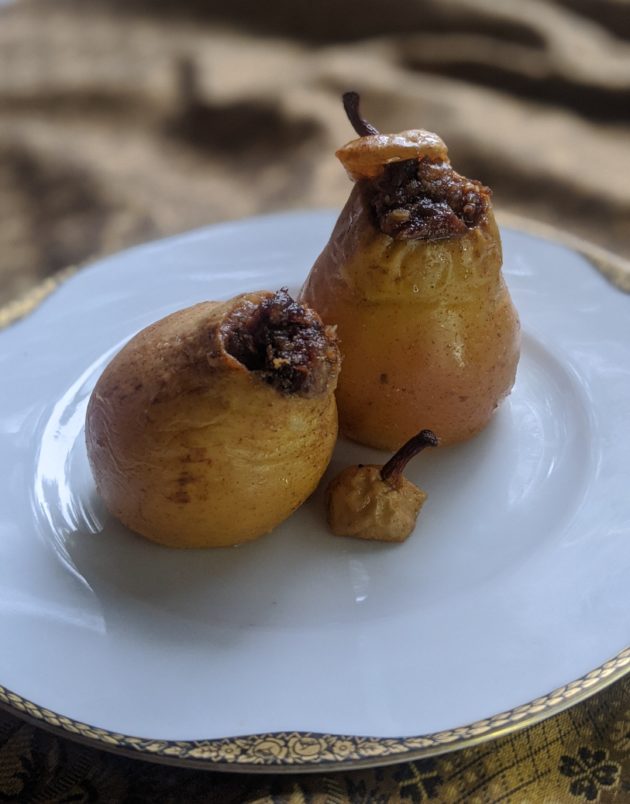Tag : Sephardic cooking
January 19, 2021 by admin
The Promise of Tu B’Shevat
Tu b’Shevat is the holiday that lets us know better days are coming.
In the midst of winter, the ground is cold and hard in many places with leafless trees silhouetted against the often-gray skies. But leafless doesn’t mean lifeless- and deep in the winter earth, things are happening. Trees and plants are awakening, gathering nutrients, making ready for the spring that is soon to come.
(more…)- No Comments
October 5, 2020 by admin
Stuffed with Abundance and Gratitude
What better way to celebrate the abundance of the harvest than by stuffing vegetables with an abundance of meat, rice, vegetables and fruits! No wonder stuffed foods are a traditional favorite for Sukkot, the festive fall holiday, for Jews from around the world.

- No Comments
July 27, 2020 by admin
Get Your Chill On
The first cold soup I ever tasted I hated. For years.
How unfortunate that it was introduced to me (dare I say pushed on me?) by the two women I admired most, my mother and my small-but-mighty Russian grandmother. Imagine walking seven long blocks home from elementary school for a tasty lunch, only to be met by a bowl of beet borscht from a jar. Yes, jarred! Two women who made from scratch the hit parade of Ashkenazic food– chicken soup, brisket, tongue, sweetbreads, both potato and noodle kugels, even gefilte fish– loved their industrial borscht, adding sour cream to complete the dish. I gagged trying to get it down, rarely succeeding.
- No Comments
July 27, 2020 by admin
Making Flatbread to Nourish Your Body and Spirit
Since humans first tamed fire and turned grain into flour, we have been making bread. In the earliest form, breads were simple. Mix one or more flours with water. Pat out into a flat cake. Cook on a hot rock or a stone hearth around an open fire. That’s it. So simple, so basic to survival. And something shared by all peoples on Earth throughout history.
As we’ve seen during this pandemic, baking bread is about more than just survival. There’s something about the bread-making process that is compelling. It’s elemental, grounding, nourishing in the most essential ways. We are now also in a time of social and political upheaval and change, which makes the qualities of bread’s emotional sustenance even more important, especially when understood together with the centrality of bread in nearly every culture, historically and in our world today. Bread, in various forms, is something all peoples share.
This awareness led me to conceive a Lilith online class focused on basic flatbreads. Participants gathered over Zoom one recent Friday afternoon before Shabbat. As I talked and mixed, kneaded and rolled out each flatbread, I felt myself becoming calmer, more centered in the moment and even more content. I ate my Shabbat dinner that night outside on my rowhouse deck in a D.C. city neighborhood—just a salad and two flatbreads from the class, one with cumin, mint and garlic in the dough topped with labne and black sesame seeds, and the other brushed with olive oil, a generous sprinkling of my homemade za’atar and pieces of beautiful, edible red nasturtium from my deck garden.
We know that bread—lechem, in Hebrew—is central to Jewish life, as demonstrated by the blessings we say before and after eating it, as well as rituals around bread such as Shabbat and holiday challot. During the tashlich ritual at Rosh Hashanah, we use bread crumbs thrown on flowing water to carry away our sins of the old year so we enter the new year ready to do better.
Bread is mentioned hundreds of times in the Torah, the first when Adam ate from the forbidden tree. God then tells Adam that now in order to have bread–food–he will have to earn it “by the sweat of your brow.” It is the moment when humans, leaving the Garden of Eden, become responsible for feeding themselves.
Torah aside, what I realized that Shabbat evening under the slowly darkening sky was how complete I felt eating the flatbread that I had made with just flour and water, as women have made it for millennia. With that simple meal, I felt deeply, indescribably connected to Shabbat and to the long history of food entwined with my ancestral Judaism.
SUSAN BAROCAS, The Lilith Blog
- No Comments
 Please wait...
Please wait...